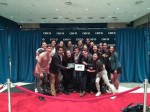A cinematographer discreetly started filming as a child actor fiddled with a solar system mobile on the set of “The Spaceman.”
The short film that carried second-year undeclared student Aman Adlakha, fourth-year English student Harit Muttreja and second-year communication studies student Will Greenberg to the 2017 Cannes Film Festival in May contains no dialogue. Instead, the narrative unfolds through the film’s soundtrack and cinematography.
Inspired by the Oasis song “D’Yer Wanna Be a Spaceman?,” the director Adlakha’s story follows a middle-aged man who reflects on his younger self’s aspiration to become an astronaut and realizes it is never too late to chase his dreams.
“It’s a personal hope of mine to not end up doing something I don’t enjoy,” Adlakha said. “When I see the message resonate with other people, it’s a great feeling.”
UCLA’s coed cinema fraternity Delta Kappa Alpha produced the film with a budget of less than $100 and submitted it to the 2016 Campus MovieFest, a student film festival program with more than 30 participating colleges and universities. Production assistant Jaie Peshawaria, a second-year political science student, said the CMF rules gave them just one week to produce a short film that is less than five minutes long.
“The Spaceman” received the Jury Award for making the top four out of 16 UCLA finalists. They were then eligible to apply for the CMF Cannes Film Festival program and have their short film screened in the festival’s Short Film Corner.
In addition to being screened in France for Cannes, “The Spaceman” was showcased in May at UCLA Studio 22’s First Take Film Festival and Campus Events Commission’s Shorttakes Student Film Festival, winning best screenwriting at Shorttakes.
When Adlakha first pitched the story of “The Spaceman,” Greenberg, the producer and composer, said he immediately had an ethereal and dreamy concept for the narrative and score.
He wrote a poem based on Adlakha’s idea of a spaceman, a symbol for unrealized dreams of the past, as a voice-over for the middle-aged man. Greenberg said he used simple yet thought-provoking words, such as “Want to be a spaceman, kid? I’ve been there. … You just wonder, when?” to help the shots and music develop the details of the story. Since the actors had no dialogue, graduate film student and editor Connor Bland said the film relied heavily on the soundtrack and visuals.
Greenberg incorporated the light sounds of a xylophone and the deeper melody of a cello to represent the contrast between the child and the middle-aged man. The self-taught pianist used his computer and keyboard to improvise and record musical layers that convey emotion by harmonizing the bright pings and melancholy drawls of the instruments.
The childlike chord progression of the xylophone and mature melody of the cello intermingle toward the end of the film, complementing a scene in a coffee shop where the man reconsiders his future with a hopeful resolve, Bland said.
“I love working on soundtrack music because you can get the point across to people no matter what language they speak,” Greenberg said.
The crew also used filming techniques such as low-key lighting and cuts, which are abrupt transitions from one sequence to another, to convey details while keeping the film short and to the point, said second assistant camera operator Rafael Perez, a third-year English student.
Perez said he aimed brighter lighting on the child and his optimistic drawing of the spaceman and produced shadows on the man during his moments of despair. Similarly, the cut transitions helped demonstrate the man’s emotional turmoil by escalating his stagger into the apartment before he starts drinking and smoking, he said.
“That’s when you know his life is taking a turn – all these visuals allow you to condense the story with just a few images,” Perez said.
Despite the complexity of the scenes, Bland said the script was only about two or three pages because Adlakha understands how to tell a story efficiently.
“As an editor, I care most about getting Aman’s – or any other director’s – vision across, but it’s a team process,” Bland said. “Everyone has to be on the same page.”
Adlakha, Muttreja and Greenberg said they didn’t expect much exposure while producing the film, making their experience at Cannes all the more rewarding. Muttreja said they made the most of every minute at the festival, taking advantage of their all-access badges to attend screenings and workshops, network with industry professionals and enjoy the red carpet experience.
“It’s kind of surreal – I’m still kind of shocked I just arrived back from France in the middle of spring quarter,” Greenberg said.
